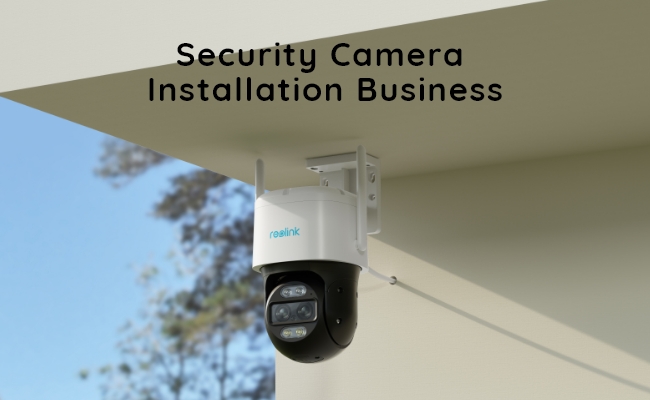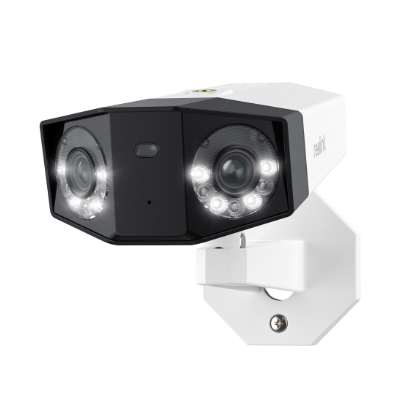Security Camera Installation Business: Reliable Expert

Security camera installation has become an increasingly vital service for both homes and businesses seeking to improve their security. As threats evolve in today's world, property owners are wise to enlist the help of reliable security camera installers to set up robust systems tailored to their needs.
In this article, we will explore running a successful security camera installation business and provide tips on finding the right provider for your next project.
- Security Camera Installation Business: Services Offered
- Tips on Starting a Security Camera Installation Business
- Security Camera Installation for Business: Key Factors to Consider
- Tips on Business Security Camera System Installation
- Security Camera Installation Cost for Business
- Bonus Tips: How to Find Business Security Camera Installation Near Me
- FAQs
- Conclusion
Security Camera Installation Business: Services Offered
A security camera installation business specializes in designing, installing, and maintaining complete video surveillance systems.
From small retail stores to expansive corporate campuses, their clients trust them to expertly assess sites, strategically place cameras, and get each system up and running seamlessly.
Core services offered include:
- Site assessment - A reputable installer will thoroughly evaluate a location to understand lighting, power sources, WiFi coverage, building materials, potential camera mounting points, and high-value areas needing coverage.
- Camera system design - Using site assessment findings, installers recommend specific cameras, networking equipment, storage solutions, power supplies, and mounting hardware tailored to each location's unique needs and budget.
- Cable wiring and management - Running video cabling through buildings and neatly concealing it protects aesthetic appeal while avoiding tampering. Expert wiring and cabling management ensures clean, reliable camera connections.
- Installation - Trained technicians neatly mount cameras, wire cabling back to networked recording devices, configure software and settings, and activate each complete video surveillance system.
- Repair and maintenance - Should any glitches arise in daily operation, skilled installers have the expertise to troubleshoot security camera issues, swap malfunctioning parts, and perform preventative maintenance for optimal uptime.
- System upgrades - As security needs evolve and new equipment emerges, installers help clients scale up existing systems with additional cameras, enhanced recording and storage solutions, or entirely new technology.
Tips on Starting a Security Camera Installation Business
1. Create a Detailed Marketing Plan
Mapping out how you will promote your new business is essential right from the start. Key marketing plan components should include:
- Competitor analysis
- Target customer profiles
- Unique value proposition and positioning
- Brand identity
- Website plan
- Advertising channels (print, digital, direct mail)
- Sales Process
2. Choose Service Areas and Target Customers
Will you serve residential and/or commercial clients? Start hyperlocal, focusing within reasonable driving distance so you can closely oversee installs. As you scale, expand into additional regions.
3. Get Insured and Licensed
Protect yourself and your clients with both general and professional liability insurance policies. Also, determine which state and local licenses are legally required to operate your business type and location.
4. Hire Reliable Workers
You can't take on every security camera deployment alone. Build a skilled team to assist with installs and service. Post job listings on industry forums and local job boards.
5. Cooperate with Camera Manufacturers and Suppliers
Partner with reputable security camera and system equipment manufacturers. Set up a dealer account enabling wholesale pricing.
6. Establish Standard Operating Procedures
Detail every process from first contact to final payments and follow-up. This includes proposals, contracts, equipment ordering, install scheduling, cabling guidelines, configuration standards, testing protocols, and service dispatch procedures.
7. Promote Your Business
Get the word out! It takes ongoing promotion through your website, print ads, directory listings, Google-ranked content, targeted emails, networking events, and customer referrals.
Security Camera Installation for Business: Key Factors to Consider
When securing business facilities large and small, properly placed security cameras provide invaluable 24/7 monitoring and evidence gathering.
Coverage
Carefully analyzes where heightened visual oversight would improve loss prevention, safety, liability protection, and productivity. High-priority zones include entry and exit points, cash handling spots, inventory storage areas, and more based on the specific business type. You can choose some models with wide-angle lenses for comprehensive monitoring areas, for example, the new Reolink Duo 3 PoE.
Groundbreaking 16MP Dual-Lens PoE Camera
16MP UHD, Dual-Lens, Motion Track, 180° Wide Viewing Angle, Power over Ethernet, Color Night Vision.
Budget
Security system costs vary widely depending on factors like total camera quantity, video resolution parameters, wired vs wireless setups, cloud vs local storage, and software capabilities.
Lighting Conditions
Cameras cannot capture what they cannot see. Evaluate existing lighting planned for security equipment across each location. Add or adjust lights as needed so cameras can properly expose images day and night.
Daily Management and Control
Appoint staff members to oversee the video surveillance system, review recordings as needed, back up critical video, swap maintenance parts, adjust camera angles, manage user permissions, etc.
Scalability
As businesses grow or relocate, their risk exposures and facilities also expand and evolve. Seek modular, upgradeable systems that allow affordable expansions.
Tips on Business Security Camera System Installation
Well-placed security cameras provide 24/7 monitoring of high-risk areas and vital assets. Follow these guidelines for business security camera system installation:
1. Place Cameras at High-Value Business Areas
Aim to overlap cameras monitoring entry and exit points, inventory storage zones, equipment rooms, perimeter fences or walls, parking areas, cash registers, and ATMs. Eliminate blind spots. starting a security camera installation business
2. Consider Camera Quality Over Quantity
A few premium, high-resolution cameras often provide better evidence and investigation value than lower-cost units. Prioritize clearer camera views over covering every possible angle.
3. Secure Data Storage
Store video recordings on password-protected local network video recorders (NVRs) or set up encrypted cloud backups providing permission-based access. Never risk losing vital evidence to tampering or hardware failures.
4. Train Staff on System Operation
Appoint team members to oversee daily system health, adjust views, access and share video clips, manage user permissions, handle maintenance issues, and complete data backups. Document procedures in an operations manual.
5. Conduct Daily Maintenance
Check camera angles, clean lenses, confirm recording status, review video sample clips, complete data backups, check cabling connections, and log any performance issues or malfunctions needing service. Don't just "set and forget" security systems.
Security Camera Installation Cost for Business
Prices to install a professionally engineered security camera system at a business facility depend primarily on the following:
- Number, Types, and Resolutions - Basic indoor/outdoor analog cameras cost $100-$200+ each. High-definition IP cameras are $200-$500 each. Computerized pan/tilt/zoom cameras run over $1,000. Adding more cameras or opting for costlier premium models increases expense.
- Data Cabling Needs - New wiring installation easily tacks on thousands of labor and materials to connect cameras back to a recording system and power supply. Leveraging existing network cabling cuts costs significantly.
Bonus Tips: How to Find Business Security Camera Installation Near Me
Seeking a local security partner, you can trust for long-term business surveillance system upkeep? Here are tips for finding business security camera system installation near me:
- Search maps for "commercial business security camera installation near me" - Map listings for installers servicing business clients in your area.
- Check reviews on Yelp, Better Business Bureau, and Google - Vet companies for satisfaction ratings, complaints, resolved issues, licensing info, and photos of actual install quality.
- Confirm proper licensing - Ensure businesses have active commercial electrical and security contractor licenses legally required to operate. Unlicensed, uninsured handymen signal risk.
FAQs
How much do security cameras cost for a business?
Complete installed costs for a quality 5-10 camera IP camera system at a small to medium-sized business run $5,000-$25,000 on average. Exact pricing depends on things like camera counts, surveillance area sizes, video storage options, wiring complexity, customization needs, and labor rates in your region.
Is home security a good business to start?
For technically skilled entrepreneurs, both residential and commercial security camera installation represents an increasingly vital service niche with huge growth potential as adoption continues rising.
With proper planning for technician hiring, insurance coverage, financing, and marketing, new providers can tap into huge demand.
Conclusion
Modern video surveillance technology offers invaluable visibility and evidence-gathering abilities for both homes and businesses. And with threat landscapes only growing more complex each year, reliance on well-designed camera systems will keep expanding rapidly. This presents prime opportunities for qualified low-voltage electrical contractors and security system installers to build thriving installation and monitoring services.
Do you want to start a security camera installation business? How do you install security cameras for your business? Share your experiences with us in the comment section below! We'd love to hear from you!
Search
Be in the Know
Security insights & offers right into your inbox

